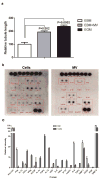Glioblastoma microvesicles transport RNA and proteins that promote tumour growth and provide diagnostic biomarkers
- PMID: 19011622
- PMCID: PMC3423894
- DOI: 10.1038/ncb1800
Glioblastoma microvesicles transport RNA and proteins that promote tumour growth and provide diagnostic biomarkers
Abstract
Glioblastoma tumour cells release microvesicles (exosomes) containing mRNA, miRNA and angiogenic proteins. These microvesicles are taken up by normal host cells, such as brain microvascular endothelial cells. By incorporating an mRNA for a reporter protein into these microvesicles, we demonstrate that messages delivered by microvesicles are translated by recipient cells. These microvesicles are also enriched in angiogenic proteins and stimulate tubule formation by endothelial cells. Tumour-derived microvesicles therefore serve as a means of delivering genetic information and proteins to recipient cells in the tumour environment. Glioblastoma microvesicles also stimulated proliferation of a human glioma cell line, indicating a self-promoting aspect. Messenger RNA mutant/variants and miRNAs characteristic of gliomas could be detected in serum microvesicles of glioblastoma patients. The tumour-specific EGFRvIII was detected in serum microvesicles from 7 out of 25 glioblastoma patients. Thus, tumour-derived microvesicles may provide diagnostic information and aid in therapeutic decisions for cancer patients through a blood test.
Figures




Comment in
-
Cancer stem cells as a prognostic indicator for glioblastoma multiforme.Biomark Med. 2010 Feb;4(1):127-8. doi: 10.2217/bmm.09.90. Biomark Med. 2010. PMID: 20387308 Free PMC article. No abstract available.
-
Glioblastoma produces tumor-promoting microvesicles.Nat Clin Pract Neurol. 2009 Mar;5(3):120-21. Nat Clin Pract Neurol. 2009. PMID: 20411603 No abstract available.
References
-
- Stupp R, et al. Radiotherapy plus concomitant and adjuvant temozolomide for glioblastoma. The New England journal of medicine. 2005;352:987–996. - PubMed
-
- Mazzocca A, et al. Cancer research. 2005;65:4728–4738. - PubMed
-
- Muerkoster S, et al. Tumor stroma interactions induce chemoresistance in pancreatic ductal carcinoma cells involving increased secretion and paracrine effects of nitric oxide and interleukin-1beta. Cancer research. 2004;64:1331–1337. - PubMed
-
- Singer CF, et al. Differential gene expression profile in breast cancer-derived stromal fibroblasts. Breast Cancer Res Treat. 2007 - PubMed
-
- Carmeliet P, Jain RK. Angiogenesis in cancer and other diseases. Nature. 2000;407:249–257. - PubMed
Publication types
MeSH terms
Substances
Grants and funding
LinkOut - more resources
Full Text Sources
Other Literature Sources
Medical
Molecular Biology Databases

